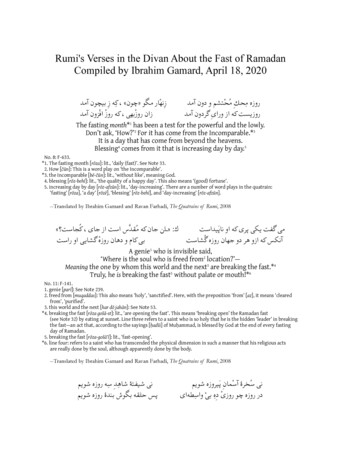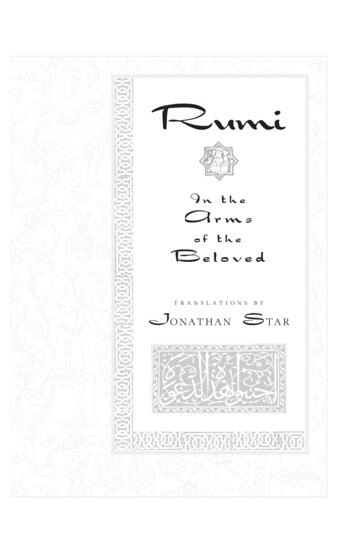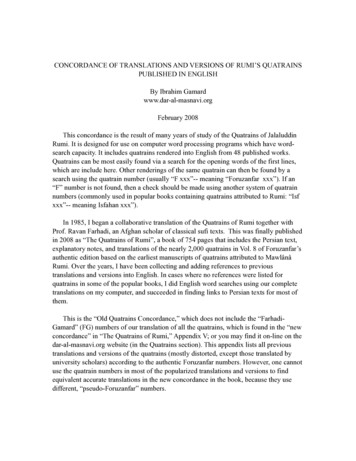
Transcription
Rumi's Verses in the Divan About the Fast of RamadanCompiled by Ibrahim Gamard, April 18, 2020 ﻛِﻪ زِ ﺑﯿﭽﻮن آﻣﺪ ، « زِﻧﻬْﺎر ﻣﮕﻮ »ﭼﻮن ﻛﻪ روزْ اﻓْﺰون آﻣﺪ ، زان روزْﺑﻬﯽ روزه ﻣِﺤﻚِ ﻣُﺤْﺘﺸﻢ و دون آﻣﺪ روز ﯾﺴﺖ ﻛﻪ از ورایِ ﮔﺮدون آﻣﺪ The fasting month*1 has been a test for the powerful and the lowly.Don’t ask, ‘How?’2 For it has come from the Incomparable.*3It is a day that has come from beyond the heavens.Blessing4 comes from it that is increasing day by day.5No. 8: F-633.*1. The fasting month [rōza]: lit., ‘daily (fast)’. See Note 33.2. How [čūn]: This is a word play on ‘the Incomparable’.*3. the Incomparable [bē-čūn]: lit., ‘without like’, meaning God.4. blessing [rōz-behī]: lit., ‘the quality of a happy day’. This also means ‘(good) fortune’.5. increasing day by day [rōz-afzūn]: lit., ‘day-increasing’. There are a number of word plays in the quatrain:‘fasting’ [rōza], ‘a day’ [rōzē], ‘blessing’ [rōz-behī], and ‘day-increasing’ [rōz-afzūn].--Translated by Ibrahim Gamard and Ravan Farhadi, The Quatrains of Rumi, 2008« ﻛُﺠﺎﺳﺖ؟ ، »ـﺎﻦ ﺟﺎن ﻛﻪ ﻣُﻘﺪﱠس اﺳﺖ از ﺟﺎی : ك ﺑﯽ ﻛﺎم و دﻫﺎن روزهْ ﮔﺸﺎﯾﯽ او راﺳﺖ ﻣﯽ ﮔﻔﺖ ﯾﻜﯽ ﭘﺮی ﻛﻪ او ﻧﺎﭘَﯿﺪاﺳﺖ آﻧﻜﺲ ﻛﻪ ازو ﻫﺮ دو ﺟﻬﺎن روزه ﮔُﺸﺎﺳﺖ A genie who is invisible said,‘Where is the soul who is freed from2 location?’—Meaning the one by whom this world and the next3 are breaking the fast.*4Truly, he is breaking the fast5 without palate or mouth!*61No. 11: F-141.1. genie [parī]: See Note 239.2. freed from [muqaddas]: This also means ‘holy’, ‘sanctified’. Here, with the preposition ‘from’ [az], it means ‘clearedfrom’, ‘purified’.3. this world and the next [har dō jahān]: See Note 53.*4. breaking the fast [rōza gošā-st]: lit., ‘are opening the fast’. This means ‘breaking open’ the Ramadan fast(see Note 32) by eating at sunset. Line three refers to a saint who is so holy that he is the hidden ‘leader’ in breakingthe fast—an act that, according to the sayings [ḥadīṡ] of Muḥammad, is blessed by God at the end of every fastingday of Ramadan.5. breaking the fast [rōza-gošā‘ī]: lit., ‘fast-opening’.*6. line four: refers to a saint who has transcended the physical dimension in such a manner that his religious actsare really done by the soul, although apparently done by the body.--Translated by Ibrahim Gamard and Ravan Farhadi, The Quatrains of Rumi, 2008 ﻧﯽ ﺷﯿﻔﺘﮥ ﺷﺎﻫِﺪِ ﺳِﻪ روزه ﺷﻮ ﯾﻢ ﭘﺲ ﺣﻠﻘﻪ ﺑﮕﻮش ﺑﻨﺪۀ روزه ﺷﻮ ﯾﻢ ﻧﯽ ﺳُﺨﺮۀ آﺳْﻤﺎنِ ﭘَﯿﺮوزه ﺷﻮ ﯾﻢ در روزه ﭼﻮ روزیْ دِهِ ﺑﯽْ واﺳِﻄﻪ ای
We are not subjugated to the destiny of the turquoise-coloured sky,And we are not enticed by a beautiful beloved1 of a few days.*2Since You are the Sustenance-Giver3 without intermediary during the Fast,*4We are therefore the slaves of the Fast, with the ring of slavery in our ears.*5No. 12: F-1359.1. beautiful beloved [šāhid]: See Note 188.*2. a few days [se rōza]: lit., ‘three days’; an idiom meaning a short time, several days. Line two mentions the brevity ofthis earthly life, and the need to avoid becoming attached to the transient attractions of worldly ‘wine, music, andbeloved’.3. the Sustenance-Giver [rōzī-deh]: lit., ‘daily (provision) giver’; an epithet of God. This is also a play on ‘days’ [rōza] inline two.*4. the Fast [rōza]: lit., ‘daily (fasting)’. A pun on ‘days’ [rōza] in line two. This refers to the daily fasting during themonth of Ramadan (for which see Note 32). Line three expresses the Muslim belief that those who sincerely fast forthe sake of God are His guests and are given provision in ways they never thought of (Qur’ān 65:3).*5. the ring (of slavery) in (our) ears [ḥalqa ba-gōsh]: Slaves used to wear a kind of ring on the ear to identify their statusas bondsmen (see Note 207). Here, it is a metaphor for intensified devotion to God during the fasting month ofRamadan.--Translated by Ibrahim Gamard and Ravan Farhadi, The Quatrains of Rumi, 2008 ﻧﺎﮔﺎه ﺑِﺠﻮﺷﯿﺪ ﭼُﻨﯿﻦ آبِ ﺣَﯿﺎت ﺻﻠَﻮات ، ﺷﺎدئ رَوانِ ﻣُﺼْﻄﻔﲐ را ﻧﺎﮔﺎه ﺑِﺮُو ﯾﯿﺪ ﯾﻜﯽ ﺷﺎخِ ﻧﺒﺎت ﻧﺎﮔﺎه رَوان ﺷُﺪ زِ ﺷﻬِﻨْﺸﻪ ﺻﺪﻗﺎت Suddenly, there grew1 a ‘branch of candy’,*2And suddenly, there bubbled such a Water of Everlasting Life.*3Suddenly, there flowed alms*4 to the poor from the king.May there be joy for the soul5 of Muḥammad, and greetings of peace!*6No. 16: F-103. Line four is identical to that in F-107 (No. 7).1. there grew [be-rōy-īd]: this is pronounced, ‘be-roy-īd’, because of metric requirements.*2. branch of candy [šāǩ-é nabāt]: lit., ‘branch of plant’; an idiom that refers to the custom, during an cEid Festival orFeast (see Note 35), of offering a gift (see Note 256) of rock candy stuck to a little branch. The candy was sometimesmade to resemble the leaves and fruit of a fruit-bearing branch. There is a word play, since ‘plant’ [nabāt] also means‘candy’. This phrase also occurs later in Ḥāfiz’s Dīwān: ‘All this honey and sugar that is dripping from my (poetic)speech is the reward of the patient endurance that was given to me by that branch of candy’ [īn hama šāhd-o šakark‘az soǩan-am mē-rēz-ad/ ajr-é ṣabrē-st k‘az ān šāǩ-é nabāt-am dād-and].*3. Water of Everlasting Life [āb-ē ḥayāt]: See Note 249. Lines one and two allude to joyous miracles as might occur in abarren desert.*4. alms [ṣadaqāt]: It is an Islamic practise to give alms to poor Muslims prior to the congregational prayer on the cEidFestival days.5. soul [rawān]: This is a pun on ‘flowed’ [rawān] in line three, another meaning of the word.*6. Muḥammad [muṣṭafà]: lit., ‘the Chosen’ (see Note 61). It is a custom to bless and praise the Prophet Muḥammad bymeans of poetry and song during the cEid Festivals.--Translated by Ibrahim Gamard and Ravan Farhadi, The Quatrains of Rumi, 2008************Please see my translation of Ghazal 2344, "The Arrival of the Moon of the Fast (of Ramadan)":http://dar-al-masnavi.org/gh-2344.html
Here is the Persian 2344/************The following are based on an email in 2008 from Behnaz Hashemipour: she found theghazals and numbered them, together with transliterations and Persian texts of the firstverses of the selected ghazals. I added translations of verses having to do withRamadan, translations made by Jeffrey Osborne in his twenty-volume translation ofRumi’s entire Dīvān. I also aded links to the Persian texts of the ghazals on ganjoor.net.----------------------------Behnaz’s letter began:“On the Discussion Board of Dar al-Masnavi, i came across a question about Mawlanaand Ramadan. I could find the following information which hopefully can be of someuse. As you know, for Mawlana, fasting is of great importance for the purification of theheart and hence the ascent of the soul. Besides numerous references and allusions tofasting in both Masnavi and the Divan, Mawlana hails and rejoices the coming of themonth of Ramadan (which he also calls 'mâh-é siyām', 'mâh-é rûzeh', and 'mahé rûzeh') in a number of Ghazals (and one Tarjî -band) devoted to the Holy Month – inaddition to the 'ruba'is' you have mentioned in your posting. For Mawlana Ramadan isan ' id' (feast) in its own right: id of the lovers. A time when by closing the mouth notonly from eating, but also from talking, they become the emptied 'Reed' or 'Lute' throughwhich the melodies of the Supreme Beloved are played.”By searching Allama Ja'fari's grand concordance to Mathnawi (Az Daryā be Daryā), onecan find allusions to the fasting under such terms like 'siam' and 'ruze', but not any hintsto the word Ramadan itself or any poems devoted to the month of Ramadan per se.The following are the first couplets of the poems mentioned above based onForuzanfar's edition of Divan-e Kabir, first published by the University of Tehran, andreprinted by Amir Kabir Publications in 1976:Tarjî -band (No. 2, vol 7, p. 91):“The month of Ramadan has come, O moonfaced friend. Tie up your knapsack and hitthe highway to heaven” (transl. Osborne, vol. 5)Mâh-é Ramazân âmad ayy Yâr-é Qamar SîmâBar band sar-é sofreh beg-shây rah-é bâlâ ﻣﺎه رﻣﻀﺎن آﻣﺪ ای ﯾﺎر ﻗﻤﺮﺳﯿﻤﺎ ﺑﺮﺑﻨﺪ ﺳﺮ ﺳﻔﺮه ﺑﮕﺸﺎی ره ﺑﺎﻻ
Ghazal (No. 370, vol. 1, p. 219):“Ramadan started, but the Eid is with us. There came a lock, but the key is with us.Ramadan shut our mouths and opened our eyes, and now, the light that the eyesbeheld is with us forever.We have purified our heart and soul by fasting, even though the fetid body is still withus.Even though there is suffering in fasting, the unseen treasure of the heart is with us.Ramadan came to serve the heart. As for the One who created the heart, He is with us.Because Salah al-Din is in this gathering, both Mansur and Bayazid are also withus.” (transl. Osborne, vol. 0/Âmad Ramazân ô Îd bâ mâstQufl âmad ô ân kelîd bâ mâst آﻣﺪ رﻣﻀﺎن و ﻋﯿﺪ ﺑﺎ ﻣﺎﺳﺖ ﻗﻔﻞ آﻣﺪ و آن ﮐﻠﯿﺪ ﺑﺎ ﻣﺎﺳﺖ Ghazal (No. 892, vol. 2, p. 198):“The month of fasting has come; the sultan’s banner has arrived.Take your hands off thefood, for spiritual nourishment has arrived. Fasting is a life-affirming sacrifice for the soul. We sacrifice the body because the soulhas arrived as a guest.Patience is like a pleasant cloud from which wisdom rains. After all, it was during themonth of patience [[ the month named Ramadan]] that the Qur’an was revealed. Whenthe ego becomes needy, the spirit ascends to heaven. When the prison’s gate is broken,the soul reaches the beloved. Wash your hands and mouth -- no more eating or speaking! Seek the morsels ofwisdom that reach those that practice silence.” (transl. Osborne, vol. 2/Âmad shahr- é sî-âm sanjoq-é (sanjûq flag) Sultân rasîdDast bedâr az ta- âm, mâ-'idah-yé jân rasîd آﻣﺪ ﺷﻬﺮ ﺻﯿﺎم ﺳﻨﺠﻖ ﺳﻠﻄﺎن رﺳﯿﺪ دﺳﺖ ﺑﺪار از ﻃﻌﺎم ﻣﺎﯾﺪه ﺟﺎن رﺳﯿﺪ Ghazal (No. 1084, vol. 3, p. 2):“The month of fasting has started. O sweet idol, it is time for kissing, not hiding away todo something else.Sit and look; put eating aside. See the myriad of parched lipped ones at the edge ofKawthar.When the old hag starts weeping, the king of fasting laughs.The heart of light becomes
stout as the wax-like body becomes lean.The lovers’ faces are yellow, but the faces of the soul and intellect are ruddy. Do notregard the bottle’s exterior, but rather its contents.Everybody has blossomed while in an intoxicated state, and the travails of Ramadanhaving been forgotten. Because of you, every morning is an Eid; because of you every evening is a Night ofPower, which is unlike that of the commoners’, which is only on a specific night.” (transl.by Osborne, vol. 84/Mâh-é rûzeh andar âmad hala(h) ay But-é cho ShekkarGah-é bûseh ast tanhâ na kenâr ô chîz- é dîgar(this and other hints to bûseh in Mawlana's Ramadâniyyât can reveal one of the secretsof (and points of ambiguity and controversy in) Persian mystical poetry). ﻣﻪ روزه اﻧﺪر آﻣﺪ ﻫﻠﻪ ای ﺑﺖ ﭼﻮ ﺷﮑﺮ ﮔﻪ ﺑﻮﺳﻪ اﺳﺖ ﺗﻨﻬﺎ ﻧﻪ ﮐﻨﺎر و ﭼﯿﺰ دﯾﮕﺮ Ghazal (No. 2307, vol 5, p. 118):“Shut your mouth to bread, for the sugar of the fasting has arrived. You have seen whateating can do -- now see what fasting can do.Tighten your belt quicker so that the king of two hundred countries can put a crown onyour head, for fastings’ belt of honor has arrived.Fly towards paradise from this hell-like world. Learn to see God through the eyes offasting. Though fasting may be hard it has a hundred virtues. For thirty days you are diving in this ocean so as to reach the pearl of fasting, O master.Consider Satan with his plans, tricks and lies. All of his arrows are broken on the shieldof fasting.Glorious fasting says it best. Close the door to speaking and open the door tofasting.” (transl. by Osborne, vol. 7/Bar band dahân az nân kâmad shekar-é rûzehDîdî honar-é khordan, bengar honar- é rûzeh ﺑﺮﺑﻨﺪ دﻫﺎن از ﻧﺎن ﮐﺂﻣﺪ ﺷﮑﺮ روزه ﺑﻨﮕﺮ ﻫﻨﺮ روزه ، دﯾﺪی ﻫﻨﺮ ﺧﻮردن Ghazal (No. 2344, vol. 5, p. 136):“Blessings be upon you! The month of fasting has come. May your path be made easy,O companion of fasting.
I went onto the rooftop in order to look for the new moon, for I wanted to start fastingwith all my soul. What luck, fortune and dignity fasting brings! The person who is patient in the well of fasting will seize love’s kingdom of Egypt, justlike Joseph.O faculty of speech, stop with your pre-fasting meal. Be silent! They will become awareof fasting through fasting.” (transl. by Jeffrey Osborne, vol. 44/Mubârak bâd âmad mâh-é rûzehRahat khosh bâd ayy hamrâh-é rûzeh ﻣﺒﺎرک ﺑﺎد آﻣﺪ ﻣﺎه روزه رﻫﺖ ﺧﻮش ﺑﺎد ای ﻫﻤﺮاه روزه Ghazal (No. 2375, vol. 5, p. 154):“Mother fasting came to her children in generosity. O child, do not let slip the dress offasting because of inattentiveness. Why are you in love with bread? See a refreshed world. Take the spiritual wheat fromthe threshing floor of fasting.” (transl. by Osborne, vol. 19)https://ganjoor.net/index.php?s %DB%B2%DB%B3%DB%B7%DB%B5&author 5&cat 99Sûy-é atfâl bî-yâmad be karam mâdar-é rûzehMahil ay tefl be sostî taraf-é châdor-é rûzeh ﺳﻮی اﻃﻔﺎل ﺑﯿﺎﻣﺪ ﺑﮑﺮم ﻣﺎدر روزه ﻣﻬﻞ ای ﻃﻔﻞ ﺑﻪ ﺳﺴﺘﯽ ﻃﺮف ﭼﺎدر روزه Ghazal (No. 2672, vol. 6, p. 35):“O heart, you will be God’s guest and worthy of heavenly sustenance when you fast.You will shut the gate to hellfire during this month and you will open a thousand doors toParadise.” (transl. Osborne, sh2672/Delâ dar rûzeh mehmân-é Khodâ-îTa- âm-é âssmânî râ sarâ-' î دﻻ در روزه ﻣﻬﻤﺎن ﺧﺪاﯾﯽ ﻃﻌﺎم آﺳﻤﺎﻧﯽ را ﺳﺮاﯾﯽ
Best regardsBehnaz
Rumi’s entire Dīvān. I also aded links to the Persian texts of the ghazals on ganjoor.net.-----Behnaz’s letter began: “On the Discussion Board of Dar al-Masnavi, i came across a question about Mawlana and Ramadan. I could find the following information which hopefully can be of some use. As you know, for Mawlana, fasting is of great .











